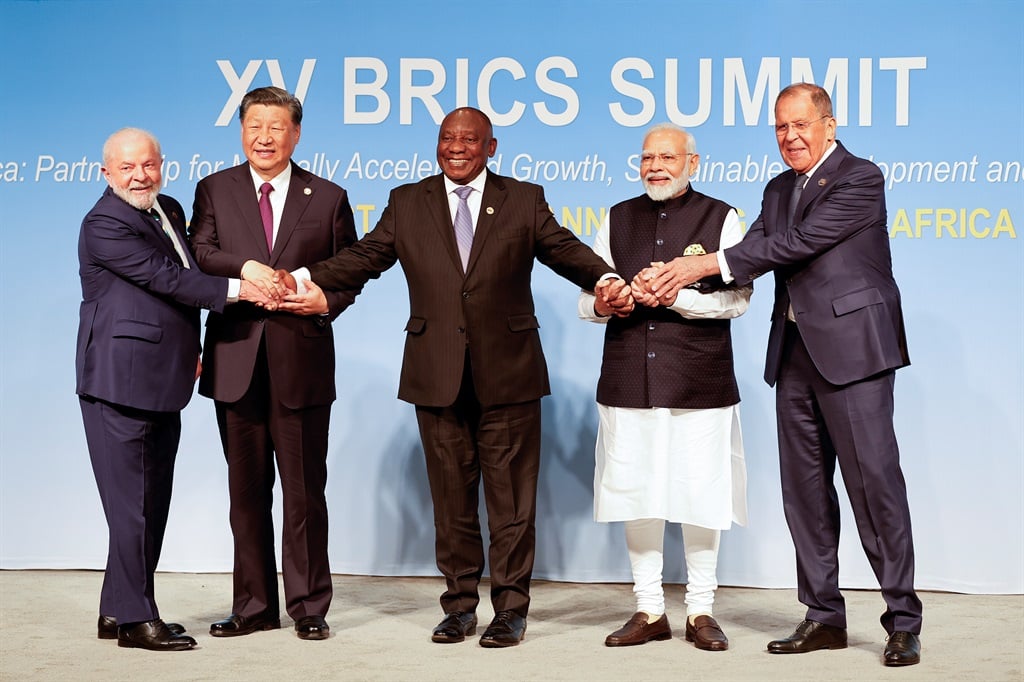
Some of the US’s top Middle Eastern allies – including the world’s biggest oil exporter – are moving closer into the orbit of China and Russia, further complicating geopolitics upended by Russia’s invasion of Ukraine.
Saudi Arabia, the United Arab Emirates and Egypt are set to join Brics after being invited. They’re likely to become members at the start of next year, along with Iran, Argentina and Ethiopia.
The move is part of a push by leaders of the Brics nations – Brazil, Russia, India, China and South Africa – to increase the group’s influence and counter US power over the global economy and trade.
READ: BRICS leaders issue call to global north to create fair markets for competition
It also signals the determination of Saudi Arabia, the UAE and Egypt to bolster their status as midsized powers while avoiding taking sides in a world increasingly split between Washington and Beijing.
The UAE said the invitation reflects its “keenness to champion the value of multilateralism”.
“The Gulf states have been reasserting themselves more forcefully on th their interests first,” said Bader Al-Saif, a professor at Kuwait University.
The US has tried to play down the expansion of Brics, with national security advisor Jake Sullivan saying Washington doesn’t see it as a budding geopolitical rival. The National Security Council declined to comment. But, in a statement after Sullivan met with counterparts from France, Germany, Italy and the UK, the White House said the Group of 20 was “the premier forum for economic cooperation”.
The G20 includes the US, EU and all the Brics countries, as well as Saudi Arabia and Argentina.
DOLLAR DOMINANCE
While Saudi Arabia and Russia already have plenty of clout in the oil market, through their leadership of Organization of the Petroleum Exporting Countries Plus, the Brics development puts greater focus on the dominance of the US dollar in energy trading. That’s particularly the case with both massive producers and importers being in the enlarged group. China is the world’s biggest buyer of crude, while Saudi Arabia is the top exporter.
Both Saudi Arabia and the UAE peg their currencies to the dollar. And they would need any other currency in which they were paid to rival the greenback in terms of liquidity and as a store of value.
READ: De-dollarisation currently a 'non-starter', despite dollar surges devaluing African currencies
As part of that, there would have to be greater demand for bonds issued in Brics currencies, analysts at ING, including the bank’s head of markets, Chris Turner, wrote this week.
Until then, “we suspect this will be a decade-long progression to a multi-polar world”, they said. It would be “a world in which perhaps the dollar, the euro and the renminbi become the dominant currencies in the Americas, Europe and Asia, respectively”.
Still, being part of Brics will offer Saudi Arabia and the UAE the opportunity and flexibility to rely less on the dollar. Both have expressed concern that the US’s imposition of export controls, financial sanctions and oil-price caps against Russia since it began the war on Ukraine could set a precedent.
“They are laying the ground for contingency planning in case relations with the US deteriorate significantly,” said Torbjorn Soltvedt, principal analyst for the Middle East and North Africa at the UK-based risk consultancy firm Verisk Maplecroft.
READ: Western powers warned to act soon or lose developing world to Russia and China
Saudi Arabia is spending trillions of dollars to diversify its economy, investing in everything from new cities to sports and electric vehicles. Crown Prince Mohammed bin Salman, the kingdom’s de facto leader, sees deeper ties with the likes of China and India as crucial to that goal.
Foreign Minister Prince Faisal bin Farhan told Saudi media:
“Brics has proven that it’s an important and useful channel for this,” especially among lesser-developed countries of the Global South.
TRADE RELATIONS
Saudi Arabia and the UAE have already built up ties with Brics members in the past decade, thanks largely to the vast oil flows that now go from the Gulf to Asia.
China and India are the top two trading partners for both Saudi Arabia and the UAE. Saudi trade with China and India reached a record of almost $175 billion (R3.268 billion) last year, according to UN data compiled by Bloomberg. It was barely $5 billion at the start of the century.
Ties between Washington and the two Gulf states have been strained in the past 18 months — partly because of their refusal to sanction Russia and their decision not to increase oil supplies when prices soared in the aftermath of the invasion of Ukraine. Those relations have improved in recent months, with the US and Saudi Arabia working on a deal that may result in the kingdom recognising Israel in return for US security guarantees.
Moreover, Riyadh and Abu Dhabi have made it clear that they want the US and Western powers to remain strong economic and security partners.




 Publications
Publications
 Partners
Partners









